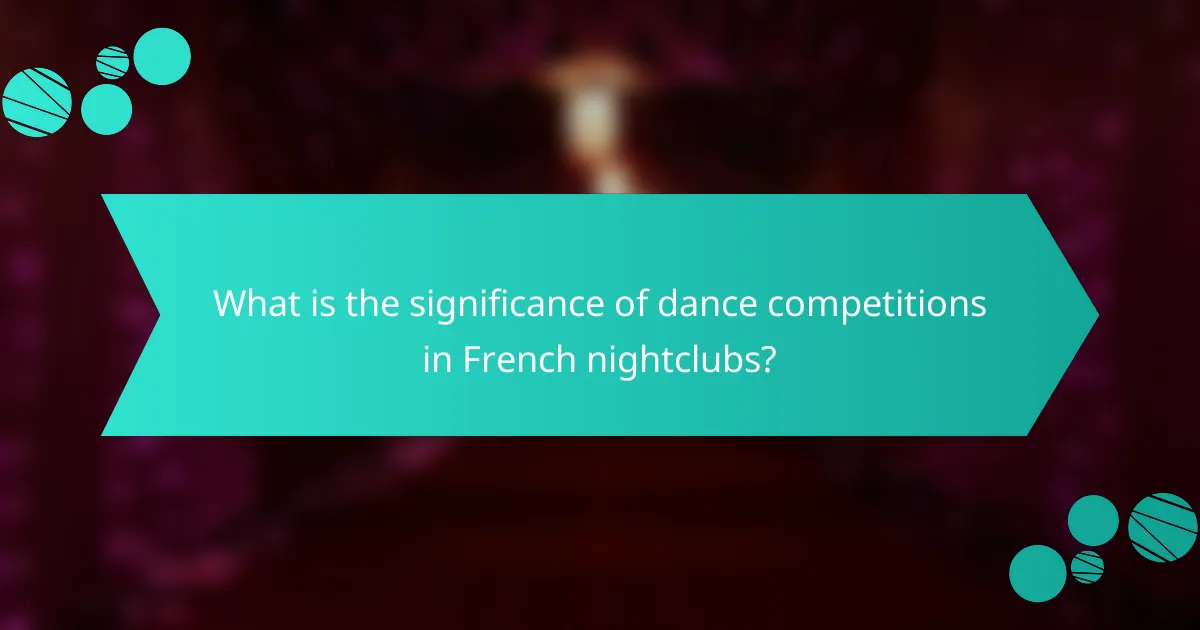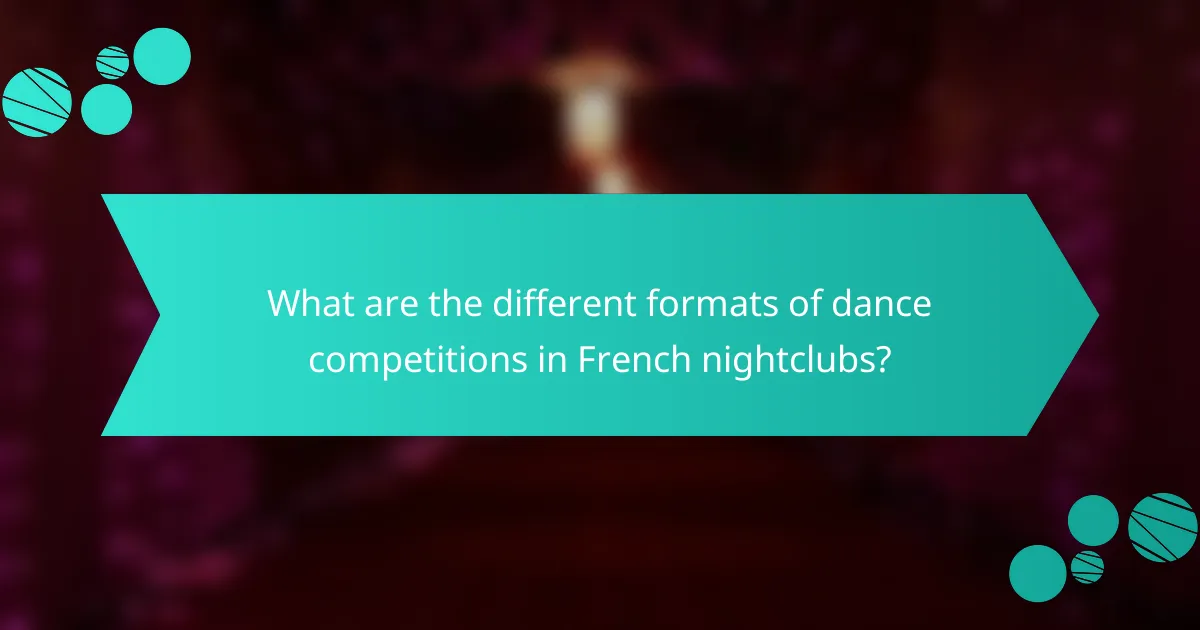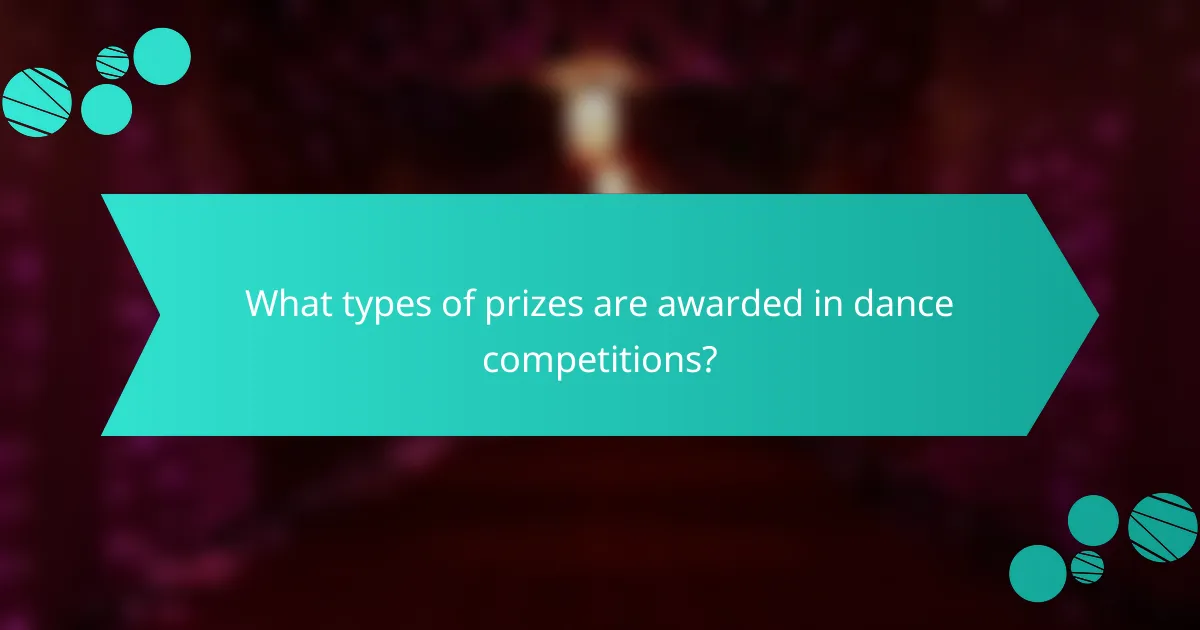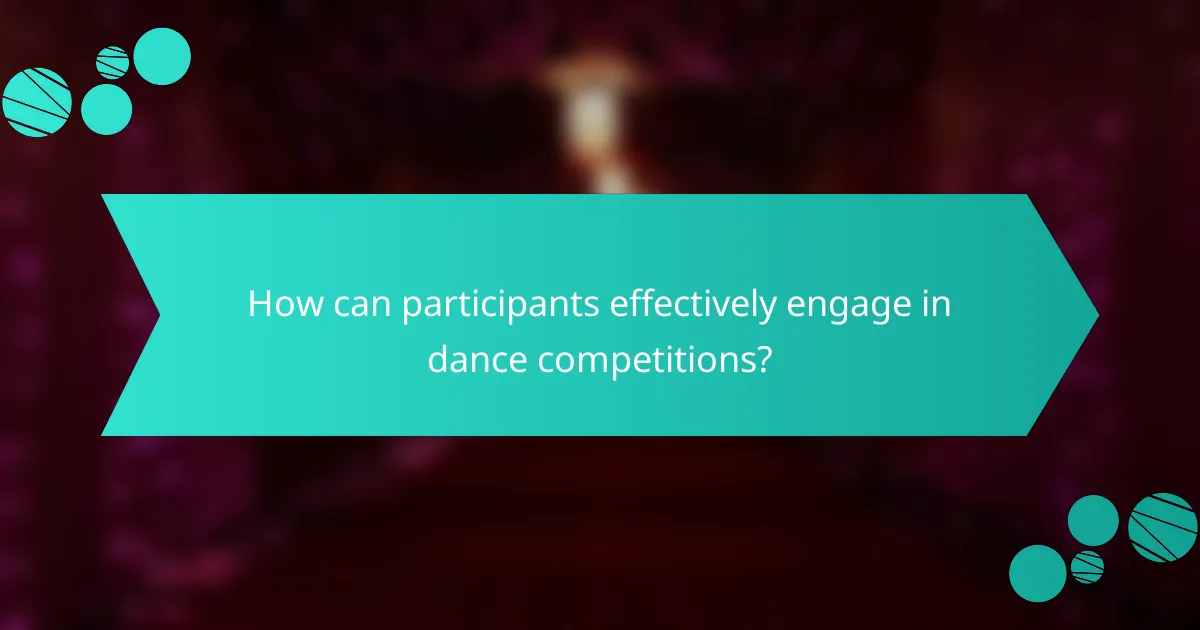Dance competitions in French nightclubs play a crucial role in enhancing community engagement and showcasing dancers’ talents. These events offer various formats, including solo performances, duo competitions, and group battles, allowing participants to demonstrate their skills and creativity. Competitions not only provide opportunities for recognition and career advancement but also foster social interaction among attendees, enriching the club culture. Prizes awarded in these competitions can range from trophies and medals to cash rewards and scholarships, motivating dancers to excel. Effective participation involves thorough preparation, understanding competition rules, selecting suitable music, and maintaining a positive attitude, all of which contribute to a successful experience in the vibrant nightlife of France.

What is the significance of dance competitions in French nightclubs?
Dance competitions in French nightclubs are significant for fostering community and showcasing talent. They provide a platform for dancers to demonstrate their skills and creativity. These events often attract large audiences, enhancing the nightlife experience. Competitions can also lead to recognition and career opportunities for participants. Additionally, they encourage social interaction among attendees, promoting a vibrant club culture. French nightclubs frequently integrate live music and DJ performances, making competitions a dynamic part of the entertainment. Overall, these events contribute to the cultural landscape of nightlife in France.
How do dance competitions enhance the nightlife experience?
Dance competitions enhance the nightlife experience by creating an engaging and dynamic atmosphere. They attract a diverse crowd, increasing foot traffic in nightclubs. Participants showcase their skills, which entertains the audience and fosters a sense of community. Competitions often feature prizes, motivating dancers to perform at their best. This competitive spirit elevates the overall energy in the venue. Additionally, events promote local talent, encouraging cultural exchange and collaboration. The presence of judges and audience voting adds excitement and anticipation. Overall, dance competitions contribute to a vibrant nightlife culture, making venues more appealing to patrons.
What roles do dance competitions play in social interaction?
Dance competitions play a significant role in social interaction by fostering community and encouraging collaboration among participants. They provide a platform for dancers to connect with peers who share similar interests. Competitors often form bonds through shared experiences and teamwork during rehearsals and performances. These events also promote networking opportunities, allowing dancers to meet industry professionals and expand their social circles. Additionally, dance competitions create a sense of belonging, as participants celebrate their passion for dance together. The competitive environment encourages healthy rivalry, which can enhance social skills and camaraderie. Overall, dance competitions serve as a vital avenue for social engagement within the dance community.
How do these competitions contribute to the cultural landscape of French nightclubs?
Dance competitions enhance the cultural landscape of French nightclubs by fostering community engagement and artistic expression. They serve as platforms for emerging talent to showcase their skills. These events attract diverse audiences, promoting inclusivity within the nightlife scene. Competitions often incorporate various dance styles, reflecting France’s rich cultural heritage. They also encourage collaboration among dancers, choreographers, and DJs, creating a vibrant ecosystem. Additionally, these competitions can drive economic activity, increasing foot traffic to venues. Historical examples include the rise of dance battles in Parisian clubs during the 1990s, which solidified their cultural significance. Overall, competitions play a crucial role in shaping the dynamic and evolving identity of French nightlife.
Why are dance competitions popular among nightclub patrons?
Dance competitions are popular among nightclub patrons due to their engaging and interactive nature. They provide a platform for social interaction and entertainment. Patrons enjoy watching skilled dancers showcase their talents. Competitions create a lively atmosphere that enhances the nightclub experience. Participants often compete for prizes, adding excitement and motivation. The thrill of competition draws in crowds and encourages audience participation. Nightclubs often promote these events to attract more visitors. This trend is supported by the growing popularity of dance culture in nightlife settings.
What motivates participants to join dance competitions?
Participants join dance competitions for various reasons. One primary motivation is the desire for recognition and validation. Competing allows dancers to showcase their skills and gain feedback from judges and peers. Another motivation is the opportunity for personal growth and improvement. Participants often seek to challenge themselves and refine their techniques.
Additionally, the social aspect plays a significant role. Competitions foster community and connection among dancers. Many participants enjoy the camaraderie and friendships formed during these events. The potential for winning prizes also motivates dancers. Awards can include cash, scholarships, or opportunities for further training.
Lastly, the thrill of competition itself is a key motivator. The excitement of performing in front of an audience can be exhilarating. This combination of factors drives many dancers to participate in competitions, enhancing their passion for dance.
How do spectators engage with dance competitions in nightclubs?
Spectators engage with dance competitions in nightclubs through active participation and emotional investment. They cheer for their favorite dancers, creating a lively atmosphere. Spectators also often vote for competitors, influencing the outcome of the competition. This engagement fosters a sense of community among attendees. Additionally, spectators may take part in social media discussions about the events. They share experiences and promote the nightclub’s events online. Dance competitions also attract spectators seeking entertainment and a unique nightlife experience. The interaction between dancers and spectators enhances the overall excitement of the event.

What are the different formats of dance competitions in French nightclubs?
Dance competitions in French nightclubs can take various formats. Common formats include solo performances, duo competitions, and group battles. Each format allows dancers to showcase their individual skills or teamwork. Additionally, some competitions feature themed events, where dancers perform based on specific styles or genres. There are also knockout rounds, where participants compete in elimination-style matches. Competitions may be judged by a panel of experts or decided by audience votes. These formats enhance the competitive atmosphere and encourage diverse dance expressions.
How are dance competitions structured in terms of format?
Dance competitions are structured in various formats, including solo, duo, and group categories. Each format allows dancers to showcase their skills in different ways. Competitions often feature rounds such as preliminaries, semifinals, and finals. Judges evaluate performances based on criteria like technique, choreography, and presentation. The scoring system typically assigns numerical values to each criterion. Additionally, competitions may have specific themes or styles, such as hip-hop or ballroom. Participants often compete for prizes, including trophies and cash awards. This structured approach enhances the competitive experience and encourages dancer development.
What are the most common competition styles observed in French nightclubs?
The most common competition styles observed in French nightclubs include freestyle, choreographed routines, and battle formats. Freestyle competitions allow dancers to showcase their individual styles and improvisation skills. Choreographed routines involve pre-planned performances set to music. Battle formats typically feature head-to-head competitions between dancers or crews, emphasizing skill and creativity. These styles reflect the vibrant dance culture in France and attract diverse participants. Nightclubs often host events that highlight these formats, fostering community engagement and artistic expression.
How do judges evaluate performances in these competitions?
Judges evaluate performances in dance competitions based on specific criteria. These criteria typically include technique, creativity, presentation, and overall impact. Judges observe the precision of movements and adherence to style for technique. Creativity is assessed through originality and innovation in choreography. Presentation encompasses the dancer’s expression, stage presence, and costume. Overall impact considers how well the performance engages the audience. Each judge assigns scores based on these factors, which are then averaged to determine rankings. This structured evaluation ensures a fair and comprehensive assessment of each performance.
What variations exist in competition formats across different nightclubs?
Competition formats in nightclubs vary significantly. Some nightclubs host solo dance competitions. Others prefer group formats, allowing teams to compete. Additionally, some venues focus on specific dance styles, like hip-hop or salsa. Others may have open formats, accepting various styles.
Judging criteria also differ. Certain nightclubs prioritize technical skill, while others emphasize creativity or audience engagement. Prizes can range from cash rewards to free entry or promotional opportunities.
The frequency of competitions varies as well. Some nightclubs hold weekly events, while others may have monthly or seasonal competitions. These variations create diverse experiences for participants and audiences alike.
How do themed competitions differ from traditional formats?
Themed competitions differ from traditional formats by incorporating specific themes that guide the performance criteria. Traditional formats generally focus on standard judging criteria such as technique and execution. In themed competitions, participants must align their performances with the chosen theme, which can enhance creativity. This unique requirement can lead to more diverse interpretations of dance styles. Additionally, themed competitions often include costumes and music that reflect the theme, adding an extra layer of engagement. This approach can attract a different audience interested in both the performance and the thematic expression. Themed competitions may also encourage more collaboration among dancers to create cohesive performances.
What unique formats are exclusive to specific nightclubs?
Unique formats exclusive to specific nightclubs include themed dance competitions, live DJ battles, and immersive performance art events. Themed competitions often revolve around specific genres like salsa or hip-hop. Live DJ battles showcase DJs competing head-to-head, judged by audience response. Immersive performance art events blend dance with theatrical elements, creating a unique experience. These formats enhance engagement and attract diverse audiences. Nightclubs like Le Queen in Paris are known for their extravagant themed nights. Events at these venues often feature exclusive formats that draw in crowds and create memorable experiences.

What types of prizes are awarded in dance competitions?
Dance competitions award various types of prizes. Common prizes include trophies for top placements. Medals are often given for individual achievements. Cash prizes are also frequently awarded to winners. Some competitions provide scholarships for dance training. Gift vouchers for dance apparel or classes may be included. Additionally, recognition certificates are often given to all participants. These prizes encourage competition and reward skill and dedication in dance.
How do prizes influence participation in dance competitions?
Prizes significantly enhance participation in dance competitions. They serve as motivation for dancers to showcase their skills. The allure of winning can attract a larger number of participants. Research indicates that competitions with substantial prizes often see increased entries. For example, events offering cash rewards or scholarships draw more competitors. Additionally, prizes can elevate the perceived prestige of the competition. This perception encourages dancers to participate for recognition and validation. Ultimately, the presence of prizes creates a competitive environment that fosters greater involvement.
What are the most common types of prizes offered?
The most common types of prizes offered in dance competitions are cash awards, trophies, and scholarships. Cash awards provide immediate financial incentives for winners. Trophies serve as tangible recognition of achievement. Scholarships often cover dance training or education, promoting further development. Additionally, some competitions offer gift certificates or merchandise related to dance. These prizes enhance participation and motivation among dancers. They also contribute to the competitive atmosphere in French nightclubs.
How do prizes vary based on competition level or format?
Prizes vary significantly based on competition level or format. Higher-level competitions typically offer larger cash prizes and more prestigious awards. For example, national competitions often provide prizes that can reach thousands of euros. In contrast, local competitions may feature smaller cash prizes or gift vouchers. The format also influences prize distribution. Solo performances might receive different rewards compared to group dances. Additionally, competition formats like elimination rounds can lead to tiered prizes, rewarding finalists more than early participants. This structure encourages higher participation and competitive spirit.
What impact do prizes have on the competitive atmosphere?
Prizes significantly enhance the competitive atmosphere in dance competitions. They motivate participants to perform at their best. The prospect of winning a prize can increase the level of effort and creativity among competitors. This heightened competition often leads to more impressive performances. Additionally, prizes can attract more participants, expanding the competitive field. The presence of rewards can also foster a sense of community among dancers. Competitors may feel more engaged and invested in the event due to the stakes involved. Ultimately, prizes contribute to a vibrant and dynamic environment in dance competitions.
How do prizes enhance the motivation of participants?
Prizes enhance the motivation of participants by providing tangible rewards for their efforts. Participants are more likely to engage and perform at their best when they have a goal to strive for. The prospect of winning a prize creates a competitive atmosphere that encourages individuals to improve their skills. Research shows that rewards can increase intrinsic motivation, as individuals feel recognized for their hard work. For example, a study by Deci and Ryan (2000) highlights that external rewards can enhance motivation when they are perceived as supportive rather than controlling. Furthermore, prizes can foster a sense of achievement and validation among participants, boosting their confidence. This increased motivation can lead to higher levels of participation and a more vibrant competition environment.
What role do sponsors play in prize offerings?
Sponsors provide financial support for prize offerings in dance competitions. They enhance the overall prize pool, making competitions more attractive to participants. Sponsors often contribute cash prizes, products, or services. Their involvement can increase visibility for both the event and the brand. For example, a sponsor might offer dance gear as prizes, linking their brand with the competition’s success. This collaboration can also lead to increased media coverage. Ultimately, sponsors play a crucial role in elevating the prestige of dance competitions. Their contributions directly impact participant engagement and competition quality.

How can participants effectively engage in dance competitions?
Participants can effectively engage in dance competitions by preparing thoroughly and practicing regularly. Consistent practice helps improve technique and confidence. Participants should also study the competition format and rules. Understanding these details can enhance performance and strategy. Additionally, participants should select appropriate music that complements their style. This choice can influence judges’ perceptions. Engaging with fellow competitors can foster a supportive environment. Networking can also lead to learning opportunities. Lastly, maintaining a positive attitude is crucial. A positive mindset can impact performance and enjoyment.
What preparation is necessary for success in dance competitions?
Successful preparation for dance competitions includes rigorous training, understanding the competition format, and mental readiness. Dancers should practice regularly to perfect their routines. They must also familiarize themselves with the specific rules and judging criteria of the competition. Physical conditioning is essential to enhance stamina and flexibility. Additionally, selecting appropriate costumes that align with the performance style is crucial. Dancers should also focus on building confidence through mock competitions. Nutrition and rest play a significant role in maintaining peak performance levels. Engaging in positive visualization techniques can further enhance mental preparation.
How can dancers improve their skills before entering competitions?
Dancers can improve their skills before entering competitions by practicing regularly and seeking professional training. Consistent practice helps build muscle memory and enhances technique. Engaging with a qualified instructor provides personalized feedback and guidance. Participating in workshops exposes dancers to new styles and techniques. Recording practice sessions allows dancers to analyze their performance critically. Setting specific goals focuses training efforts on areas that need improvement. Collaborating with peers fosters a supportive environment for growth. Lastly, attending competitions as an observer offers insights into performance standards and expectations.
What strategies can participants use to stand out during competitions?
Participants can stand out during competitions by showcasing unique dance styles and techniques. Developing a signature move can create a memorable impression. Engaging with the audience through eye contact and expressions enhances performance appeal. Consistent practice improves skill level and confidence. Participants should also pay attention to costume choice, as distinctive outfits can draw attention. Networking with judges and fellow competitors can provide valuable insights and opportunities. Additionally, utilizing social media to share performances can increase visibility and attract support. These strategies collectively enhance a participant’s presence and competitiveness in dance competitions.
What tips can enhance the overall competition experience?
To enhance the overall competition experience, participants should focus on preparation, engagement, and feedback. Preparing adequately includes practicing routines and understanding the competition format. Engaging with fellow competitors fosters a supportive atmosphere. Seeking constructive feedback from judges improves skills for future events. Additionally, maintaining a positive mindset boosts performance. Staying hydrated and rested contributes to physical readiness. Finally, enjoying the experience makes competitions more memorable and fulfilling.
How can participants manage performance anxiety during competitions?
Participants can manage performance anxiety during competitions by employing various strategies. Deep breathing techniques help calm the nervous system. Visualization of success can enhance confidence and reduce anxiety. Practicing regularly in a competitive environment prepares participants for the actual event. Setting realistic goals allows for manageable expectations. Positive self-talk reinforces a constructive mindset. Engaging in mindfulness exercises promotes present-moment awareness. Research indicates that these methods can significantly lower anxiety levels, enhancing overall performance.
What should dancers consider when choosing a competition to enter?
Dancers should consider the competition’s reputation and judging criteria. A well-regarded competition attracts quality judges and participants. Dancers should also evaluate the competition format, whether solo or group performances are allowed. Understanding the prize structure is essential, as it can influence motivation and participation. Additionally, dancers must assess the location and date to ensure availability. The level of competition should match their skill level for a fair experience. Lastly, feedback opportunities can enhance learning and growth. These factors collectively contribute to a dancer’s success and satisfaction in competitions.
The main entity of this article is dance competitions in French nightclubs. The article explores the significance of these competitions in fostering community, showcasing talent, and enhancing the nightlife experience in France. It details various competition formats, including solo and group performances, and discusses the types of prizes awarded, which motivate participation. Additionally, the article examines how these events encourage social interaction and contribute to the cultural landscape of nightlife, highlighting the roles of judges and audience engagement in the competitive atmosphere. Overall, it provides a comprehensive overview of the dynamics and impact of dance competitions within the nightclub scene in France.